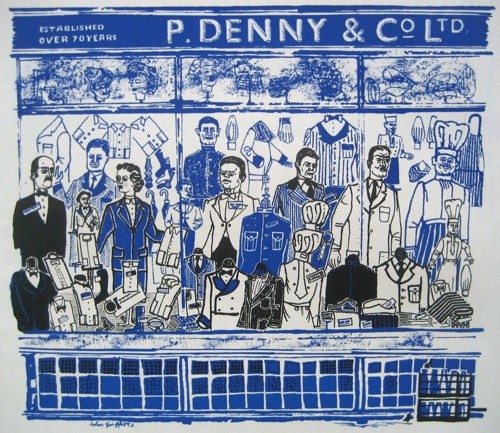The real revolution in social won't be online
One of the 24 illustrations by Eric Ravilious for Highstreet published in 1938. 
We are undertaking a major project in Saatchi & Saatchi at the moment on the future of the high street. While this is a subject that has been repeatedly dug over in the past couple of years as the high street has imploded in the UK, we have chosen to look at a very specific audience. Rather than turning to the retail experts, household shoppers, urban planners or politicians we have focused instead on young people aged 16 to 29. If the high street has a future then this is it.
We have unearthed a powerful story about both the failure of the high street to meet the needs of this group and profound optimism for its future from these digital natives.
There are three fundamental things that young people are asking of the high street - social connection, local pride and opportunities for entrepreneurialism. And I have been giving a bit of thought to the first of these.
What gets me excited about the desire for social connection is when you move beyond urban planning solutions (seemingly always provided through copious seating and skateboard parks) and inside the retailers. The high street was always brilliant at ‘social’ as we now seem to call it - the authentic and engaged voice of the brand or business - after all this really was a place where everyone knew your name. But the truth is that modern retail has destroyed the sociability of the high street replacing it with something that is far easier to control from head office - service.
Now I am not arguing for one minute that service isn’t important in retailing along with the other elements of the retail trinity - value and quality. But that service has squeezed out sociability and that without it the high street really doesn’t have a hope since it can’t do value, range, or many aspects of quality or service as well as online or out of town. Nowadays a trip to your so called Sainsbury’s Local or Tesco Express can take place with absolutely no human connection whatsoever as you choose and pay for your goods on your own. And the fact is no one minds because the value of the social connection that preceded it was so low automated check out didn’t really make things any worse.
Of course there is a place where brands are tentatively experimenting with being more sociable, in social media. Of course this is proving profoundly difficult precisely because sociability runs counter to the instincts of big brands and businesses. However, I believe that the real revolution in social will come not when brands are sociable in social media (important though this is) but when they crack sociability face to face and specifically in their high street presence.
And one of the exciting things about this is that its can’t be solved with more data. In many respects the key to great service online, out of town or on the high street is great data but it is bugger all help in improving sociability - that is a deeply human skill that algorithms will never be any good as the principal requirement is humanity.
A rapid injection of sociability is not a panacea to solve the problem of our dying high street but an important part of the solution that differentiates the this essential part of our daily lives from the retail alternatives.
Comments
Interesting - looking forward to the full report if you decide to make it publicly available? I think there's major benefits to be had for any local authority brave enough to rethink their high street to encourage fledgling businesses (vast reductions in business rates, stipends to young entrepreneurs). I returned home to St Albans (not exactly a poor place) over Christmas and was pretty shocked to see almost half the high street taken over by pound shops and low-end, temporary establishments with little to recommend them. Whether it's the transient effects of the recession or the result of a longer-term decline in the viability of bricks and mortar retail, it's clear to me that majorly new thinking is needed.
Posted by: Aaron at January 16, 2012 01:40 PM
I couldn't agree more. I've never understood why, for example, a brand like HMV hasn't tried to make their stores more social spaces. They can't compete with Amazon's algorithms and long tail in bricks and mortar - but they can certainly capitalise on the passion for music (and/or film)their staff and customers have.
There are potentially benefits here for all kinds of retailers but for those like HMV who operate in categories that people really want to talk about and where friendly knowledge, expertise, debate and recommendation are highly valued, it just seems so bloody obvious.
Posted by: AJ (@AJ_ay_it) at January 16, 2012 05:15 PM